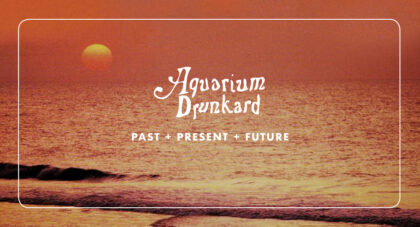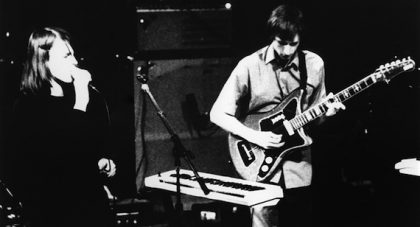The first thing you hear as you set the needle down on “Faith and Grace” is the spectral sound of Roebuck “Pops” Staples’ guitar, and then the voices of his children, Mavis, Cleotha, Pervis, and Yvonne. These are the first sounds the Staple Singers put to tape, huddled around a microphone in 1953, recording for the first time for the Royal label in Chicago. “Faith and Grace” was issued along with “These Are They” that year, and the songs have remained unavailable until now, with the release of Faith and Grace: A Family Journey 1953-1976, which includes them on a 7” single along with four discs of music which charts much of the band’s lifespan, documenting their journey from gospel powerhouse to the “house band” of the civil rights movement, from righteous soul ballads to sly, slinky anthems. The band serves as a through line from the blues to gospel, from folk to funk, an American institution defined by the unique sonic qualities of Pops’ trembling guitar and Mavis’ powerful voice and a dedication to their personal faith.
The Staple Singers :: Low Is The Way
“Up until hip-hop, they touched on all these essential sounds of their times,” says Joe McEwen, producer of Faith and Grace, though the combo’s bluesy grooves would be sampled by Big Daddy Kane, Salt-N-Pepa, UGK, and Nelly. The Staples’ style and story was “spectacular” one, McEwen says. The boxset caps off a historic year for the Staples, during which the family’s story, and the late Pops’ in particular, was illuminated in panoramic style. First came the release of Pops’ final recordings, Don’t Lose This, completed by Mavis Staples and Jeff Tweedy, then, the remarkable Freedom Highway Complete, a live Staples set recorded at New Nazareth Missionary Baptist Church in Chicago in April 1965, at the height of the Civil Rights movement. With Faith and Grace, which includes the group’s earliest recordings, one’s able to trace American musical history.
“I look at Pops as the visionary of the family,” McEwen says. “His story is incredibly compelling, beginning with his birth and childhood on the famous Dockery Plantation, which was home to Charley Patton, Robert Johnson, and Howlin’ Wolf, among many others, and then his story subsequent, that he chose the path of the gospel and not the blues – though he learned to play guitar from Charley Patton – and carved out a singular path and sound for himself and his family.”
Only the good shit. Aquarium Drunkard is powered by its patrons. Keep the servers humming and help us continue doing it by pledging your support.
To continue reading, become a member or log in.


